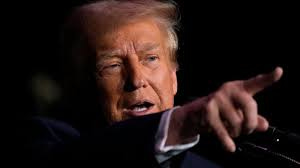The Supremes, Those Dancing Clowns That Decide Our Laws, Can Deny Trump the Presidency
Much of America has itself in a lather about whether the Supreme Court will rule against Donald Trump’s presidential run, on the basis of Article Fourteen of the Constitution. They are particularly distressed because the Court has already seen fit to deny Colorado’s decision to remove him from the primary ballot in that state.
The Supreme’s Colorado decision made an excellent point
It should not be in the power of any state to affect a candidate’s presidential aspirations on its own. States rights only go so far. We fought a Civil War over the right of southern states to secede from the union. The Supreme Court, in one of the few decisions it actually found correctly lately, recognized that Colorado had gone too far.
Perhaps more importantly, some thirteen states were in line to follow Colorado, so that door was properly closed forever.
But hold on, folks, the D.C. Circuit Court may have come to the rescue, with flags flying and bugles blowing
In An Airtight Ruling Against Trump, The Atlantic lays out the D.C. Circuit Court’s rejection of the former president’s bid for immunity. Unfortunately, that article is behind a paywall, so I’ll have to hit on the highlights for you:
“On July 24, 1974, when the Supreme Court issued its decision in United States v. Nixon, ordering President Richard Nixon to produce the Watergate tapes, the president turned to his chief of staff, Alexander Haig, to understand what had just happened. He later recounted the exchange in his memoirs:
“Unanimous?” I guessed.
“Unanimous. There’s no air in it at all,” he said.
“None at all?” I asked.
“It’s tight as a drum.”“These words echoed through my mind today, nearly 50 years later, as I read the historic opinion of the United States Court of Appeals for the District of Columbia Circuit in United States v. Trump, holding that former President Donald Trump does not enjoy immunity from prosecution for any crimes he committed in attempting to end constitutional democracy in the United States.”
George T. Conway III, who authored the Atlantic article goes on to say, “The opinion far exceeds any commentator’s poor power to add or detract, so I’ll mostly let it speak for itself. The bottom line:
“For the purpose of this criminal case, former President Trump has become citizen Trump, with all of the defenses of any other criminal defendant. But any executive immunity that may have protected him while he served as President no longer protects him against this prosecution.”
But the Supremes can enforce Article Fourteen without lifting a finger
Should they care to, the nine black-robed Supremes have a handy tool at their disposal, one that gets them off the dangerous hook they tremble to confront. They can merely sit back, take a long sigh of relief, and simply refuse to issue a writ of certiorari.
See now, you sold me short, not knowing how up-to-the-task I was on matters of how the Supremes choreograph their legal dance steps.
Gotcha!
The Donald has appealed the D.C. Court’s decision all the way up the last rung of the ladder to, who else, the Supremes. The finding on that appeal Trump so eagerly hopes to see is called a writ of certiorari. Refusing that writ—something they do with great regularity—means that the decision being appealed will stand.
There is no further court in which to appeal
Bingo! Donald J. Trump may no longer run for re-election as president of the United States.
_______________________________
You may sign up for The Trump Trials by George T. Conway III, a newsletter that chronicles the former president’s legal troubles. Long way around, perhaps, but the article appears there in full.

